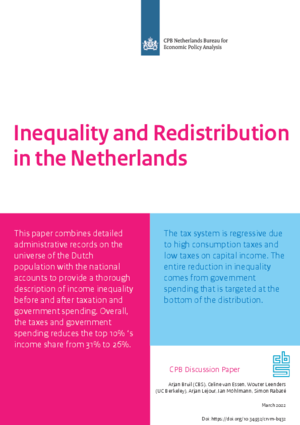Inequality and Redistribution in the Netherlands
We combine detailed administrative records on the universe of the Dutch population with national accounts aggregates to provide a thorough description of income inequality before and after taxation and government spending.
Overall, taxes and government spending reduce the top 10%'s income share from 31% to 26%. We decompose this difference between pre- and post- tax income and show two main results. First, the tax system is regressive due to high consumption taxes, flat social contributions and a low tax on capital income. Second, the entire reduction in inequality comes from government spending that is targeted at the bottom of the distribution.
We finally provide a wide set of alternative scenarios to investigate the sensitivity of our results to different distributional assumptions. Our main conclusions are robust to this sensitivity analysis.
Downloads
Authors




